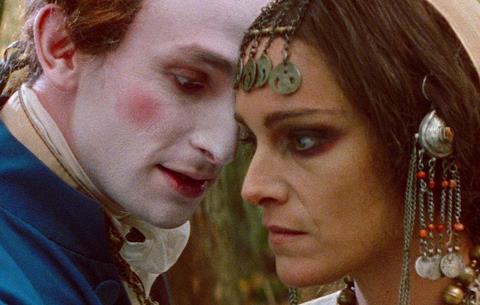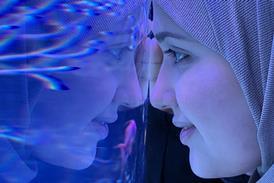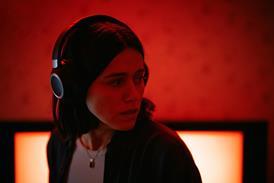Tolstoy’s blood-sucking novella gets an imaginative reworking by French stylist Adrien Beau

Dir: Adrien Beau. France. 2023. 90 mins
In the dark of night, a terrified aristocrat throws himself on the mercy of humble strangers and gets much more than he bargained for in The Vourdalak. Adrian Beau’s lush debut feature is an imaginative adaptation of the Aleksei K. Tolstoy 19th century novella that is happy to wear its influences in plain sight. The seductive stylings of a Jean Rollin vampire tale rub shoulders with the grand guignol chills of a Roger Corman stab at Edgar Allan Poe and the gothic flourishes of a vintage Hammer horror. Genre fans and lovers of the macabre will appreciate the intelligence and craft that has gone into a tasty blend of blood, wit and social commentary. The Vourdalak oozes cult potential and should attract theatrical interest following a world premiere in Venice Critics Week.
Enticingly treacly, oozing cult potential
A former designer for the likes of John Galliano and Agnes B, Adrian Beau previously directed the clever fantasy shorts La Petite Sirene (2011) and Les condiments irreguliers (2011). The Vourdalak begins in full throttle gothic mode. Thunder rumbles, rain lashes down and flashes of lightning provide the only illumination in a pitch black night. King’s envoy Jacques Antoine Saturnin D’Urfe (Kacey Mottet Klein) is desperate for sanctuary. Brigands have killed his escort, stolen his luggage and left him without a horse. He is reluctantly offered hospitality and warned that the forest “seethes with danger”.
Shot in Super 16, the film is enticingly treacly. The setting is atmospheric and Beau certainly knows how to build menace from the threatening, squelching noises of the soggy countryside to the candle-lit gloom of the chilly-seeming interiors. The Vourdalak treads a familiar path but Beau steers it just this side of camp.
A powdered, pale-faced popinjay, D’Urfe is thankful for the shelter but often horrified by the family he encounters. Klein’s performance ensures that he is always the gentleman but this is clearly not a world he knows. The unappetising broth, doom-laden stone pile and hostility to his presence leave him appalled even as he struggles not to show it. His cowardly, silly-ass responses provide comic capital but gradually fade to reveal a more substantial, good-hearted figure.
D’Urfe learns that he is at the home of old Gorcha. Gorcha’s eldest son Jegor (Colin), is married to Anja (Claire Duburcq)) and has a young son Vlad (Gabriel Pavie). He also meets Gorcha’s cross-dressing son Piotr (Schneider) and is beguiled by Gorcha’s daughter Sdenka ( Abed) .
It transpires that Gorcha has been absent for some days, seeking to avenge an attack by the Turks and kill their leader Alibek. He has requested that his family wait six days for his return. If he does not come back he will have died in battle. If he returns after six days then he will be no more than an “ accursed Vordalak”, a kind of vampire. The knowledge that Vourdalak like to feast on their nearest and dearest means that everyone is in danger no matter how much some of them might be in denial.
The coup de grace in The Vourdalak is when Gorcha does return. He is played by a marionette that Beau operates. Beau also provides the voice. Gorcha has the skeletal look of a Gollum or something that might have escaped from the Ray Harryhausen workshop. He is also great fun as he adds considerably to the entertainment value in comic moments that echo Corman’s more light-hearted Poe adaptations (Tale Of Terror, The Raven etc) or the irreverence of the Evil Dead series.
Tolstoy’s novella predates Dracula and was previously filmed as part of Mario Bava’s horror anthology Black Sabbath (1963) starring Boris Karloff as Gorcha. Beau’s distinctive approach is highly engaging as it balances menace and mirth. What surprises is the way Beau manages to flip the horror to embrace some of the underlying pathos in a tale of tragic love, family loyalty, suffocating notions of masculinity and a brutal patriarchal rule.
Production companies: Les Films du Bal, Master Movies
International sales: WTFilms, sales@wtfilms.fr
Producer: Judith-Lou Levy
Screenplay: Hadrien Bouvier, Adrien Beau based on La Famille du Vourdalak by Aleksei K. Tolstoy
Cinematography: David Chizallet
Production design: Thibault Pinto
Editing: Alan Jobart
Music: Martin Le Nouvel, Maia Xifaras
Main cast: Kacey Mottet Klein, Ariane Labed, Gregoire Colin, Vassili Schneider
















